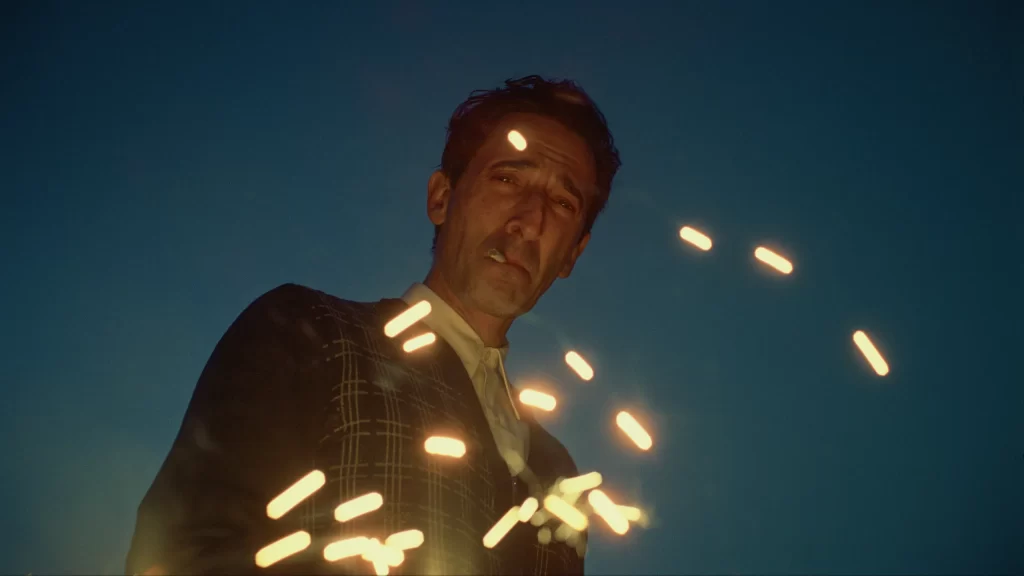
The American dream gets flipped upside-down in The Brutalist, Brady Corbet’s soaring, scathing portrait of post-war greed. Yet while it may be a troubling tale of moral decline, it opens with its hero going up, up, up, climbing toward the prospect of salvation. His name is László, and we first see him in the steerage of a ship docking at Ellis Island, his pallid skin and crooked nose long shielded from the light of day. As his mind recites a letter from his absent wife, he begins to ascend along with countless other sweaty hopefuls, the camera swooping and twisting like he’s navigating a labyrinth. When he finally bursts onto the deck, his face breaks into an ecstatic grin, the sunlight beaming down on him, the score’s trumpets booming in triumph. Never mind that our first view of Lady Liberty comes at an inverted angle, as though she’s about to plunge her torch—and its elusive promise of prosperity—into the harbor.
This knockout introduction instantly signals The Brutalist’s monumental ambition, both thematic and aesthetic. Much has been made of the film’s length (over three-and-a-half hours, including a 15-minute intermission), but its running time is just one of its many extravagances. Corbet, eschewing subtlety in favor of sheer grandeur, has delivered a truly maximalist production, a work of sweeping scope, vigorous style, and provocative rhetoric. The movie is, to borrow the tagline from Scott Pilgrim vs. the World, an epic of epic epicness.
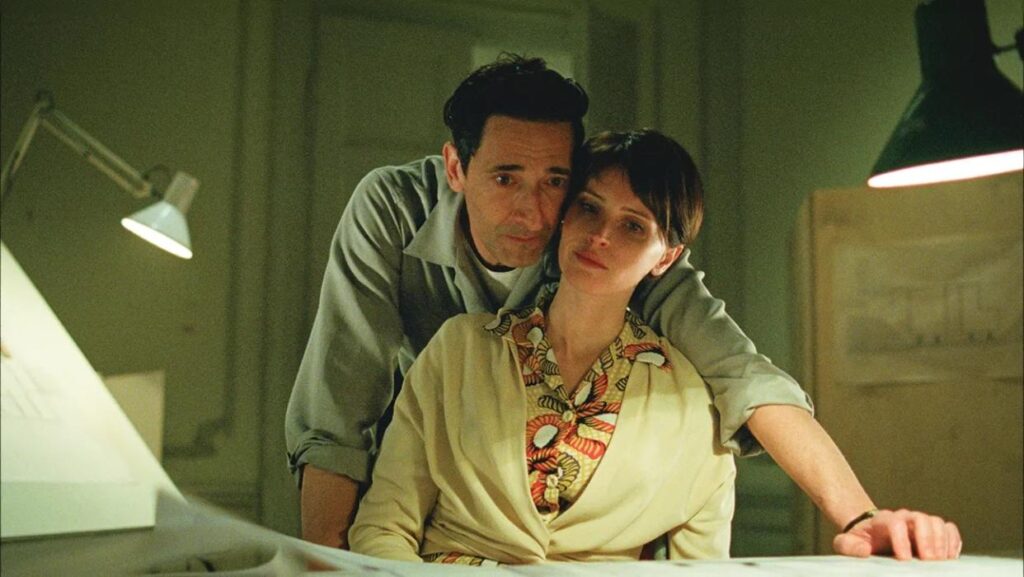
The danger of such a mighty enterprise is that it will collapse under its own colossal weight. So perhaps the greatest achievement of The Brutalist, beyond its lofty aspiration or prodigious technique, is how entertaining it is. It doesn’t exactly undercut its own grandiosity with intimacy—this is a big movie through and through—but it marshals its bigness in the service of a gripping story and richly drawn characters. It may be huge, but it isn’t ponderous.
The screenplay, which Corbet wrote with his partner Mona Fastvold, takes the shape of a bildungsroman, following László (Adrien Brody) over a fraught 13-year period. A gifted architect, his plan upon emigrating from Hungary is to work at a Philadelphia furniture store run by his cousin, Attila (Alessandro Nivola). They’re hired by a wealthy failson (Joe Alwyn) to renovate the library at the handsome estate of his father, Harrison (Guy Pearce). Things at first go badly for László—an awkward dance with Attila’s wife arouses suspicion, a misunderstanding with their client spirals into a heroin habit—but eventually Harrison plucks him from poverty and commissions him to oversee construction of a sprawling community center on the vast green land near his manor.
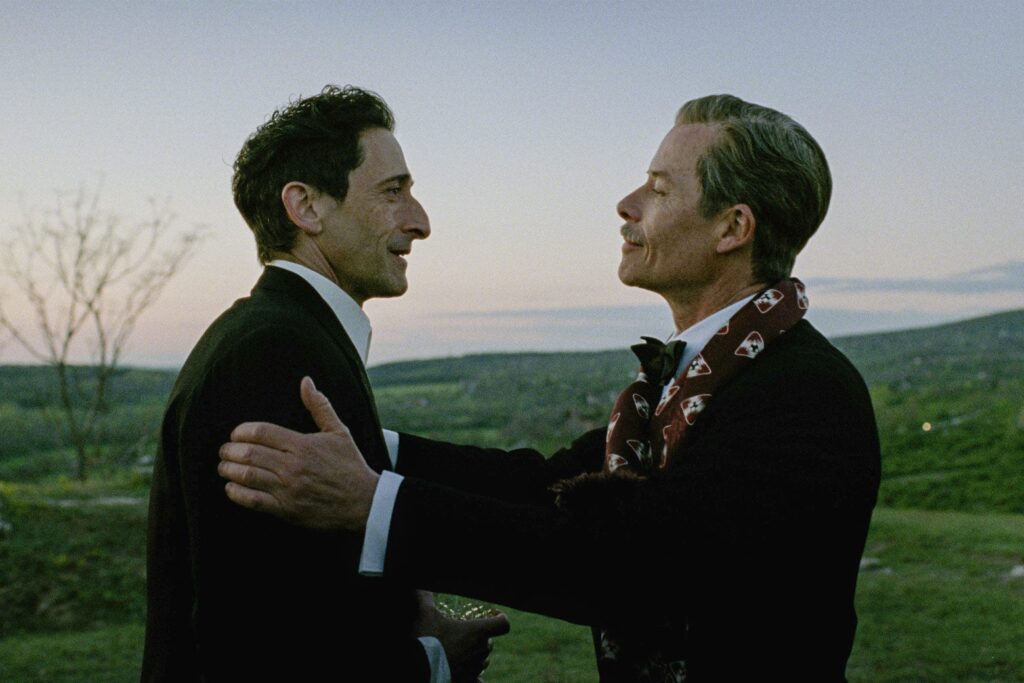
In terms of plot, The Brutalist isn’t complicated; most of the film revolves around László struggling to build a glorified YMCA. (The facility is meant to house a library, a gymnasium, and a chapel; when László inquires if it should also include a swimming pool for children, Harrison curtly responds, “I don’t swim.”) Yet the straightforward premise contains ample room for a bustling collection of ideas. The movie is, among other things, an exploration of the complexity of marriage, a treatise on the immigrant experience, an appreciation of architectural beauty, a jaundiced study of capitalism, and a testament to the healing power of handjobs.
Above all, it is a demonstration of Corbet’s own craft. That may make it self-indulgent, but the actor-turned director has earned his opportunity to show off. His prior feature was Vox Lux, an ambitious, ungainly effort that suffered from its obvious strain to imitate Lars von Trier (whom Corbet worked for in Melancholia). The Brutalist is even more elaborate, but despite its evident classicism—its arresting overture, its stately production values, its VistaVision printing process—it never feels derivative. Instead it envelops you with the rapture of its technique: the smooth gliding and steady holding of its camera (the cinematographer is Lol Crawley), the jazzy bombast of Daniel Blumberg’s score, the fluid integration of historical footage (promotional videos lauding Pennsylvania steel, radio broadcasts about the formation of Israel), even the boldly horizontal orientation of its opening credits. It’s a work of enormous scale that’s been made with exquisite, omnipresent rigor.
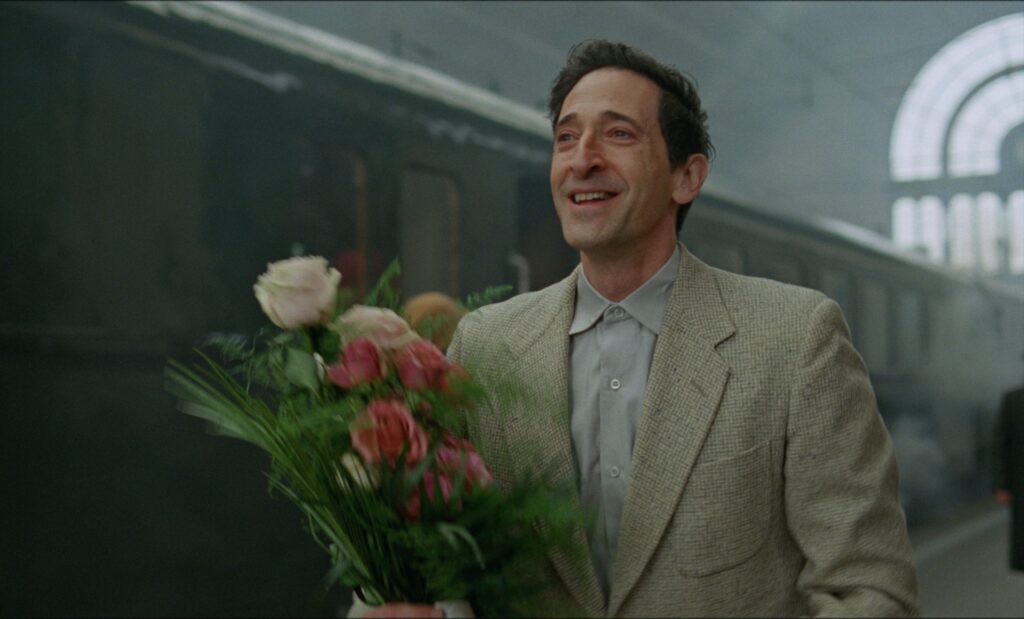
As the man featured in so many of the movie’s precise compositions, Brody is mesmerizing; deploying an Eastern-European accent similar to the one that earned him an Oscar for The Pianist, he foregrounds László’s intelligence, but he also conveys the man’s arrogance and petulance. (When he requests a quiet moment with an ostensible peer whom he’s been squabbling with, it seems like a gesture of reconciliation, only for him to say, “Everything that’s ugly, cruel, and stupid is your fault.”) Yet while László would undeniably deem himself the hero of this story—and in most respects, he is—he’s defined primarily through his relationships with two other characters.
The first is obviously Harrison, whose role ranges from patron to confidant to obstacle to outright enemy. Harrison fancies himself a benefactor, a generous soul who wields his considerable means to help those in need and to shine a light upon his town. But strings are attached to his purse, and it gradually becomes clear that his support of László, whom he parades to his posh guests like a rescued dog, is really an act of self-aggrandizement. Harrison is happy to dispense funds so long as he owns everything and everyone in sight, and Pearce, in a vigorous and blustery performance, makes plain the magnate’s true nature: his pride, his rapaciousness, and—as you may have surmised—his brutality.
Too much so, perhaps? The movie’s most unpleasant stretch occurs when László and Harrison travel to Italy to obtain vaunted marble. What happens there is ghastly, and also the one moment when the film verges on outright miserabilism.
What pulls it back from the brink is the other key figure in László’s orbit: his wife, Erzsébet (a terrific Felicity Jones). We don’t meet her until after the intermission, when she and her niece (Vox Lux’s Raffey Cassidy) finally join László in the States and he’s shocked to find her in a wheelchair. That discovery throws their marriage into immediate stress, yet Erzsébet proves to be more than just a helpless wallflower; she rises to her husband’s needs while also recognizing his shortcomings, and Jones, with her clipped speech and perceptive eyes, brings real depth to the role. And though László may be the story’s fulcrum, Corbet and Fastvold imperceptibly begin to prioritize Erzsébet, culminating in a long take at Harrison’s mansion that’s exhilarating in its catharsis.
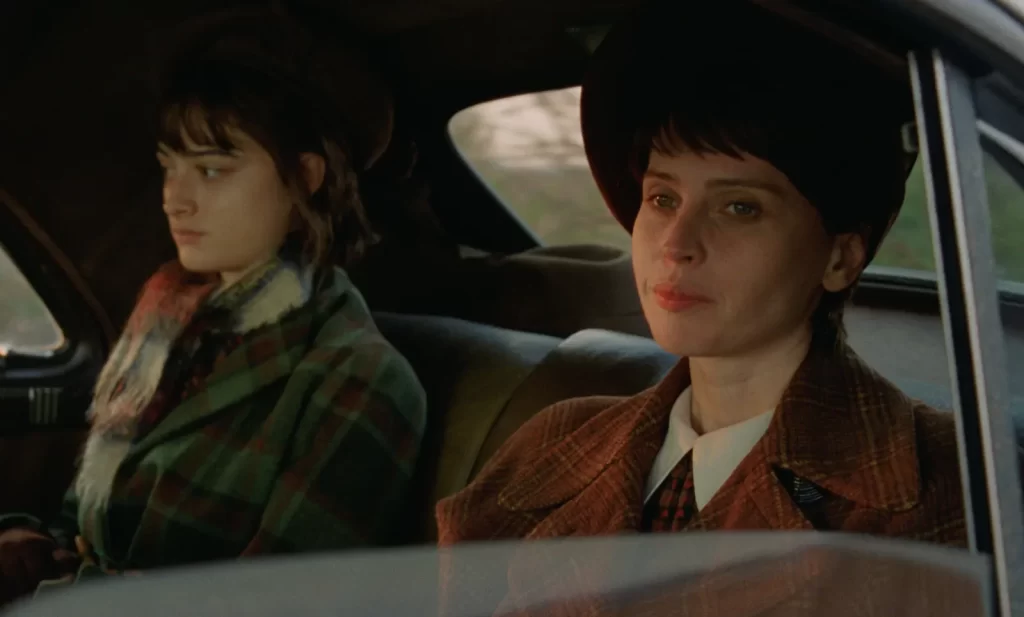
In terms of both its robust craftsmanship and its human personalities, The Brutalist is a work of considerable force. But it isn’t just a blunt instrument; it has plenty to say. Most visibly, it is a fiery depiction of the 20th-century Jewish diaspora. László and Erzsébet remain haunted by their wartime suffering, but they aren’t mere victims; Erzsébet yearns to make a new homeland in Israel, while we learn that László’s design for the community center intentionally evokes the interconnected corridors of concentration camps—a bold feat of reclamation that also plays in fascinating tension with the moonlit cross he’s devised for the site’s chapel.
Powerful stuff. Yet the specificity of The Brutalist also feels universal. “They don’t want us here,” László spits at Erzsébet, and the perpetual truth of his statement hits hard, especially given that a convicted felon just re-assumed office in the White House while flaunting his plans for mass deportation of immigrants—some of whom just happen to be called “dreamers.” At one point, a woman characterizes László’s oeuvre with the epigram “The Presence of the Past.” The Brutalist is undoubtedly a period piece, recreating its bygone era with remarkable verisimilitude and conviction. In doing so, it casts a sharp, mournful eye toward the future.
Grade: A-
Jeremy Beck is the editor-in-chief of MovieManifesto. He watches more movies and television than he probably should.
